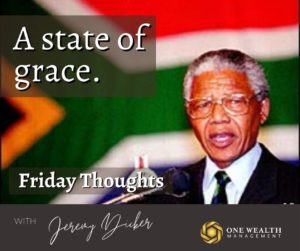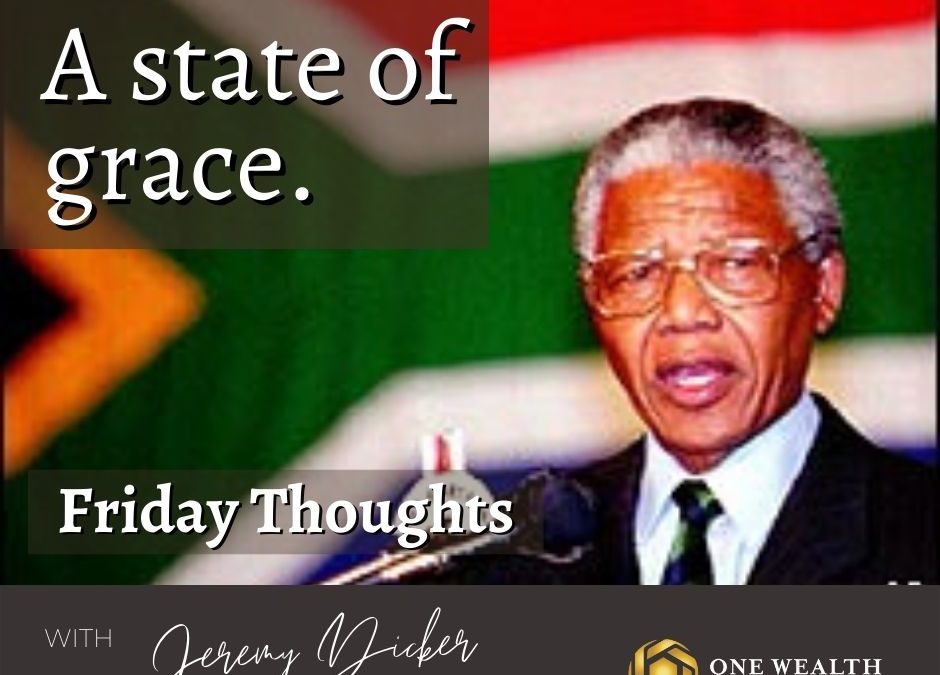 In 1994, Nelson Mandela was elected President of South Africa. During the inauguration, he was surrounded by dignitaries and world leaders, celebrities, and heads of state alike. It was a special event that signaled the death knell of apartheid. The world watched.
In 1994, Nelson Mandela was elected President of South Africa. During the inauguration, he was surrounded by dignitaries and world leaders, celebrities, and heads of state alike. It was a special event that signaled the death knell of apartheid. The world watched.
Mandela climbed up to the pulpit, adjusted the microphone, and spoke.
The audience and everyone watching around the world expected him to recognize the many dignitaries in attendance, expound on his victory, or deliver vitriol toward his enemies.
Instead, Mandela showed the world what grace looks like.
He turned to his left, towards three white men in attendance, and asked them to stand.
He then publicly thanked them.
These three men were guards that watched over him while he was imprisoned at the notorious Robben Island, spending 18 of his 27 years incarcerated there.
Mandela genuinely thanked them for how they treated him while imprisoned. He acknowledged that he’d been treated with dignity and respect. As the country was on the precipice of a revolution, spiraling towards unprecedented bloodshed, Mandela wanted these three white prison guards to know that he did not forget their humanity.
No flash. No pomp and circumstance, just extending reconciliation toward three men who were charged with being his captors.
Mandela could have taken the road of division and revenge. How could he not after being jailed for the better part of three decades? Most within his own party called for him to do just that.
But instead, he chose to thank them publicly, offering the nation an important symbol that they should all forgive and move forward.
I recently read about Mandela’s story and thought about how this applied to my life, the lives of our clients, and so many others.
Yesterday, while visiting with a client in her 80s and her daughter, we reviewed the investment plan in place and the trust amendments recently drafted. We talked about how her eldest son (now is his late 40s) was no longer included in the family planning and why. For reasons unbeknownst to them, he had not spoken to the family for eight years. No one really understood why, but he’d just stopped speaking to them.
So, my client and her daughter wanted to plan and prepare for if (and when) he contested the trust. We did just that.
As I walked out of the house with my client’s daughter, I asked her how she felt. All she could say was “pain.” By the look on her face, I saw that to be true and empathized.
I am not sure why we hold on to things, why we struggle to forgive or let go and move on. Too often, petty things become mountains. Our grudges tip the scales and end up defining our relationships. For some reason, we feel power in that. It feeds our ego.
But the real power is in letting go, in forgiveness. That is where we’ll find grace.
If we could all just flip the narrative and focus on letting people be. Respect, agree to disagree, and simply move on. Imagine what the world would look like. Imagine how we would feel, the baggage we could discard instead of weighing us down.
Personally, as we march toward the end of the year and set our focus on hopes for the new year, I feel tremendous excitement for what’s in store. I am most excited not about what I might add to my life, but what I can let go of; how I can grow. I look forward to the opportunity to be a better advisor, partner, father, husband, and friend.
As Mandela understood, there is no more important pursuit than this, and I’m eternally grateful to have that clarity.
-J.D.

